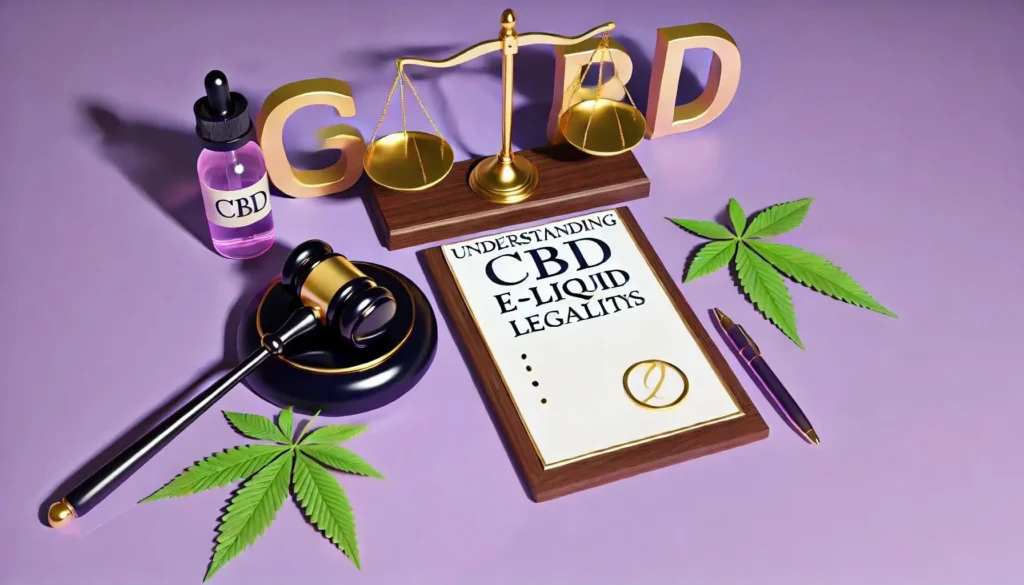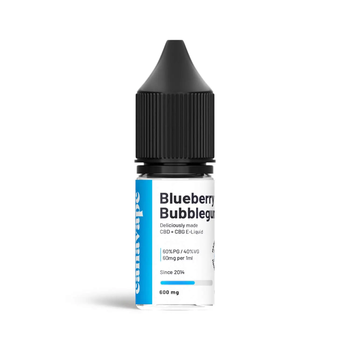
Navigating the legal landscape of CBD e-liquid can be daunting, given the evolving regulations surrounding its use and sale. CBD, or cannabidiol, a compound derived from the hemp plant, has gained popularity for its potential health benefits without the psychoactive effects of THC. However, its legal status varies widely depending on location and jurisdiction, adding complexity to its purchase and consumption.
This document aims to demystify the legalities of CBD e-liquid, providing a clear and comprehensive guide to help you understand where you stand legally when using or purchasing these products. Join us as we explore the crucial aspects of CBD e-liquid legality to ensure informed and responsible usage.
CBD, short for cannabidiol, is one of the many compounds found in the cannabis plant. Unlike THC, the compound responsible for the “high” associated with marijuana, CBD is non-psychoactive, making it appealing for therapeutic use. People often turn to CBD for its potential to alleviate pain, reduce anxiety, and promote relaxation.
E-liquids, on the other hand, are liquids used in electronic cigarettes or vaporizers. When heated, these liquids produce a vapor that can be inhaled. CBD e-liquids combine the benefits of CBD with the convenience of e-cigarettes, allowing users to consume CBD in a way that’s easy and efficient. This method of consumption is particularly popular because it allows CBD to enter the bloodstream quickly, offering potential benefits in a shorter time frame compared to other methods like edibles or tinctures.

The popularity of CBD e-liquids has surged in recent years, reflecting a broader acceptance of CBD products in general. As more people seek natural alternatives for health and wellness, CBD has emerged as a favoured option due to its non-psychoactive nature and potential therapeutic benefits. E-liquids, known for their convenience and rapid onset of effects, have become a preferred method for consuming CBD.
Usage trends indicate a diverse demographic, from younger adults seeking stress relief to older individuals looking for pain management solutions. The vaping community has also embraced CBD e-liquids, integrating them into daily routines. Social media and word-of-mouth have played significant roles in driving this trend, as users share positive experiences and product recommendations.
As a result, the market for CBD e-liquids has expanded, offering a variety of flavours and concentrations to meet different preferences and needs, further cementing their place in the wellness landscape.
In the UK, the legality of CBD e-liquids is governed by strict regulations that differentiate between controlled cannabinoids and non-controlled substances. CBD (cannabidiol) itself is not classified as a controlled substance, but the key legal requirement is that any product must contain less than 0.2% THC (tetrahydrocannabinol), the psychoactive compound found in cannabis. Exceeding this 0.2% threshold would make the product illegal, as THC is a controlled substance under the Misuse of Drugs Act 1971.
For businesses selling CBD e-liquids in the UK, compliance with this THC limit is essential. Products must be accurately labelled, clearly stating the cannabinoid content to ensure they meet legal requirements. Failure to do so can lead to legal consequences, including product recalls or enforcement action by trading standards authorities.
Unlike the US, where the FDA regulates CBD, the UK’s Food Standards Agency (FSA) oversees the safety and labelling of ingestible CBD products. While CBD e-liquids fall outside the direct remit of the FSA because they are intended for vaping, it’s important for businesses to follow clear guidelines to ensure safety and compliance.
Ingestible CBD products, such as oils or edibles, must go through the FSA’s novel foods approval process. This process ensures that products meet safety standards before they can be legally marketed in the UK. Although this doesn’t directly apply to CBD e-liquids, businesses should still ensure their products are well-regulated and transparent, avoiding any health claims that cannot be substantiated.
The UK’s stance on CBD products is relatively stable, but the market is closely monitored, and regulations continue to evolve. Authorities are particularly vigilant about the safety of consumers and the quality of CBD products being sold. For example, it’s important to avoid making unverified claims about CBD’s therapeutic benefits unless the product is licensed as a medicine.
Businesses should also be aware that CBD products marketed in the UK must not be promoted as having medicinal effects unless they are licensed through the Medicines and Healthcare products Regulatory Agency (MHRA). Most CBD e-liquids are sold as wellness or recreational products, so clear and compliant marketing is essential.
One key advantage for businesses operating in the UK is the consistency of regulations across all four nations: England, Scotland, Wales, and Northern Ireland. Unlike in the US, where state laws can vary widely, the UK’s regulations are applied uniformly, meaning there is no additional complexity related to regional law differences.
However, businesses must still ensure that their product labels, advertising, and cannabinoid content comply with both the FSA’s guidelines and the broader legal framework. This includes clear, accurate labelling of THC and other controlled cannabinoid levels.
For consumers and businesses alike, understanding and complying with the UK’s CBD regulations is crucial for enjoying the benefits of CBD e-liquids without legal complications. Ensuring that products meet the 0.2% THC threshold, are properly labelled, and do not make unverified health claims will help businesses avoid legal risks and provide a safe, transparent experience for consumers.
With careful adherence to the law, businesses can confidently navigate the UK’s growing CBD market, providing high-quality, compliant products that meet the needs of a diverse range of consumers.
When it comes to CBD e-liquids, quality and safety standards are pivotal in ensuring consumer safety and product efficacy. Unlike prescription medications, the CBD industry is not uniformly regulated, which can result in varying product quality. To address this, reputable manufacturers often adhere to rigorous testing protocols, providing third-party lab results to verify purity and potency. These lab tests typically check for CBD concentration, the presence of contaminants like heavy metals or pesticides, and THC levels.
Consumers should look for products that are transparent about their sourcing and testing. Quality CBD e-liquids will clearly display lab results and certifications on their packaging or website. Additionally, choosing products made from organically grown hemp can reduce exposure to harmful chemicals.
Understanding and prioritizing these standards can help consumers make informed choices, ensuring they receive the full benefits of CBD while minimizing health risks. Ensuring compliance with these standards fosters trust and credibility within the burgeoning CBD market.
Labelling and marketing compliance are essential components of the CBD e-liquid industry, as they directly impact consumer trust and legal adherence. Accurate labelling is crucial; it must detail the CBD concentration, THC levels, ingredients, and any potential allergens. Misleading or false claims can lead to regulatory action from bodies such as the FSA, which monitors ingestible CBD product marketing closely.
Marketing compliance involves avoiding unverified health claims. While CBD may offer potential health benefits, companies must refrain from asserting medical claims that lack scientific support. The FDA has issued warnings to companies exaggerating CBD’s effects, underscoring the importance of truthful marketing.
To navigate these challenges, businesses should engage in transparent communication and ensure their marketing strategies align with current regulations. This approach not only helps prevent legal issues but also fosters consumer confidence. By adhering to strict labelling and marketing guidelines, companies can build a reputable presence in the competitive CBD market.
Purchasing CBD e-liquids can be done through various channels, each offering different advantages. Specialty vape shops and dispensaries are popular choices, providing knowledgeable staff who can offer guidance on product selection. These stores often carry a range of products, allowing consumers to compare options and find a product that fits their needs.
Online retailers also present a convenient option, offering a broader selection of CBD e-liquids from the comfort of home. When buying online, it’s vital to choose reputable retailers who provide detailed product information and third-party lab results to ensure quality and safety.
Additionally, some health food stores and wellness shops stock CBD e-liquids, appealing to consumers interested in holistic health products. Regardless of the purchasing method, it’s important to verify the product’s legality in your state and ensure it complies with local regulations. Being informed and cautious can help consumers make confident, safe, and satisfying purchases of CBD e-liquids.
Using CBD e-liquids legally requires awareness of your countries regulations. As per UK law, CBD products must be derived from hemp and contain no more than 0.2% THC. This ensures they are not classified as marijuana or cannabis, which remains illegal other than for medical use on prescription. However, in other countries, laws can vary significantly, with some jurisdictions imposing stricter controls on CBD products.
To use CBD e-liquids legally, consumers should first verify the THC content and ensure the product complies with their state’s regulations. It’s also crucial to purchase from reputable sources like Canavape that adhere to quality standards.
Additionally, public usage may have restrictions similar to tobacco products, so it’s important to be mindful of local laws regarding vaping in public spaces. By staying informed and cautious, users can enjoy the benefits of CBD e-liquids while remaining compliant with legal standards, ensuring a responsible and worry-free experience.
The legal landscape for CBD e-liquids is continuously evolving, influenced by ongoing research and shifting public perceptions. As more studies explore the potential benefits and risks of CBD, regulatory bodies may adjust laws to reflect new findings. The FSA, for instance, is actively evaluating data to determine CBD’s safety and efficacy, which could lead to clearer regulations and guidelines for manufacturers and consumers.
Additionally, further medical cannabis legislative changes could align with or diverge from current standards, creating a dynamic legal environment. Public opinion and advocacy could also drive reforms, especially as more people advocate for broader access to CBD products for health and wellness.
As these potential changes unfold, staying informed is crucial for consumers and industry stakeholders. Monitoring legislative developments and adapting to new regulations will ensure continued compliance and responsible usage. The evolving nature of CBD e-liquid legality signifies a promising yet complex future for this burgeoning market.
Potential legal changes in the CBD e-liquid sector could significantly affect both the industry and consumers. For manufacturers, clearer regulations could mean more stringent compliance requirements, but they also offer the opportunity for greater legitimacy and market expansion. Companies may need to invest in better quality control and transparent labelling to meet new standards, fostering trust and credibility.
For consumers, legal clarity might enhance confidence in product safety and efficacy, potentially increasing demand. As regulations solidify, consumers could benefit from a wider range of high-quality products with standardized labelling, making informed choices easier. This could also stimulate innovation as companies strive to differentiate themselves in a competitive market.
However, navigating these changes requires adaptability from both producers and consumers. Staying informed and engaged with the regulatory environment will be essential for maintaining compliance and leveraging the opportunities presented by evolving legal standards. Ultimately, these changes could lead to a more robust and reliable CBD e-liquid market.